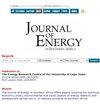一个系统的决策支持系统,客观地评估回顾性的能源效率建模方案
IF 0.6
4区 工程技术
Q4 ENERGY & FUELS
引用次数: 1
摘要
税收优惠是南非政府用来激励能源效率的方法之一。其中一项激励措施是1962年《所得税法》第12L条,该条款允许由于可量化的能源效率(EE)节省而大幅减税。相关的能效节约是通过基线模型计算的,必须符合国家测量和验证标准,即基于国际惯例的SANS 50010。本研究开发了一种方法,帮助具有激励应用的EE项目客观地评估潜在的建模选项,并最终选择最终模型。该方法基于加权和法。通过将其应用于三个实际案例研究,并将案例研究的结果与正式和成功的激励应用的独立结果进行比较,进一步验证了这一点。该方法允许透明地选择符合相关税收激励监管要求且不受个人偏见影响的模型选项。本文章由计算机程序翻译,如有差异,请以英文原文为准。
A systematic decision support system to objectively evaluate retrospective energy efficiency modelling options
Tax incentives are one of the methods used by the South African government to incentivise energy efficiency. One of these incentives is Section 12L of the Income Tax Act (1962), which allows a significant tax deduction as a result of quantifiable energy efficiency (EE) savings. The associated EE savings are calculated by means of baseline models and must be in accordance with the national standard for measurement and verification, i.e. SANS 50010, which is based on international practice. The present study developed a methodology that assists EE projects with incentive applications to objectively evaluate potential modelling options and ultimately select a final model. This methodology is based on the weighted sum method. It is verified by applying it to three actual case studies and is further validated by comparing the results obtained from the case studies to independent results of formal and successful incentive applications. The methodology allows for a transparent selection of a modelling option that is compliant with the relevant tax incentive regulatory requirements and untainted by personal bias.
求助全文
通过发布文献求助,成功后即可免费获取论文全文。
去求助
来源期刊

Journal of Energy in Southern Africa
ENERGY & FUELS-
CiteScore
3.00
自引率
0.00%
发文量
16
审稿时长
6 months
期刊介绍:
The journal has a regional focus on southern Africa. Manuscripts that are accepted for consideration to publish in the journal must address energy issues in southern Africa or have a clear component relevant to southern Africa, including research that was set-up or designed in the region. The southern African region is considered to be constituted by the following fifteen (15) countries: Angola, Botswana, Democratic Republic of Congo, Lesotho, Malawi, Madagascar, Mauritius, Mozambique, Namibia, Seychelles, South Africa, Swaziland, Tanzania, Zambia and Zimbabwe.
Within this broad field of energy research, topics of particular interest include energy efficiency, modelling, renewable energy, poverty, sustainable development, climate change mitigation, energy security, energy policy, energy governance, markets, technology and innovation.
 求助内容:
求助内容: 应助结果提醒方式:
应助结果提醒方式:


